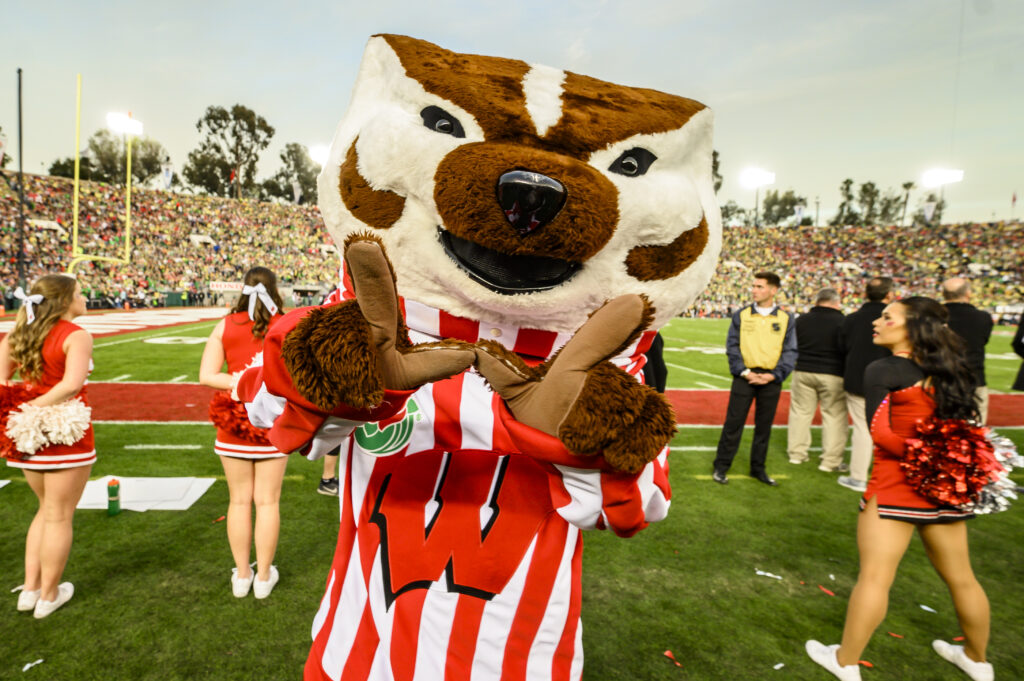by Evan Engel
Every practice, as Wisconsin’s football players and coaches march onto the practice field, everything is perfectly in place. The cones are lined up, the pads are set, the footballs are neatly arranged. Drills run smoothly, the helmets are crisp and clean, and the jerseys are spotless. When practice ends, they head for the locker room, leaving behind a field littered with equipment, sweat soaked towels and jerseys, and the remains of another grueling training session. Yet, by the time they return the next day, it’s as if none of it ever happened. Everything is in its place, prepped, and ready to go.
This is the work of the Wisconsin student managers, the silent engine that keeps the Wisconsin Football Program running. They are the first to arrive and the last to leave, ensuring that every detail is handled so that the players and coaches can focus on the game. Their efforts go unnoticed and their names are rarely mentioned, but for one night every year, that changes.
The Rusty Toolbox Game, an annual flag football showdown between Wisconsin and Iowa’s student managers, is more than just a friendly competition: It’s a moment of recognition. It’s a chance for those who work tirelessly behind the scenes to showcase their football skills and earn respect from the players and coaches they serve.
The Role of a Student Manager
Being a student manager is not only about setting up and taking down drills and washing jerseys; it is a demanding and grueling job that requires long hours and a deep understanding of the game. Managers also have to balance higher education simultaneously. They arrive hours before the first whistle of practice, ensuring that every single aspect of practice is prepared and ready to go. Adjustments are made on the fly, as coaches often change their minds on drills and equipment as practice goes on. No matter what, the managers find a way to get it done.
For Nick Barry, a junior studying economics, being a student manager is something he has been dedicated to since before classes even started his freshman year. He earned the role of head student manager just after his second season. “We do a little bit of everything,” says Barry. “We’re part of the team in a different way. We might not be on the field during games, but we are there every step of the way.”
Similarly, Cole Trautmann, who’s pursuing a degree in industrial engineering, found his place with the team as a freshman. By his second season, he stepped into the role of special teams manager. “In order to be a student manager, you have to understand the game on a deeper level. You have to be able to put yourself in the mind of a player and a coach and think of problems before they happen.”
Wisconsin’s managers are also responsible for assisting position coaches, helping execute travel logistics, and aiding in game-day operations. During the season, it is normal for the student managers to work 40+ hours a week, with only one day off. Their work is critical, and though they receive little public recognition, the players and staff know how much they contribute.
The Meaning Behind the Game
The Rusty Toolbox tradition started back in 1991 as a way for the managers from Wisconsin and Iowa to compete for bragging rights and a trophy, the rusty toolbox. Over time, it has turned into a fiercely competitive battle, filled with pride and intensity that the managers look forward to each season.
“For us, it’s more than a game,” Trautmann explains. “It’s our chance to step onto the field and show our players and coaches that we have some skill too.”
Throughout the season, the managers dedicate their own time to preparing for the game—watching film from previous years, running drills, and even designing plays. The night before the official Wisconsin vs. Iowa football game, it’s finally their turn to be in the spotlight. While it’s technically flag football, the intensity is real: there’s plenty of contact—just without the pads. It’s not unusual for managers to walk away with sprains, fractures, and more than a few bruises.
The sidelines are always filled with friends, family, and former managers. Even the players and coaches will stop by to watch the game. Sometimes, they give their two cents on what they are seeing.
One such moment came when former Wisconsin Linebacker Chris Orr, watching from the sidelines, saw an opportunity to help. Recognizing a weakness in the managers’ defensive scheme, he stepped in and called for an adjustment mid-game.
“That was huge for us,” Barry recalls. “Not only did his adjustment help us, it boosted our confidence. It felt good knowing that we had some of our guys cheering us on and were pulling for us to win. I mean, we do that for them every Saturday.”
A Night to be Recognized
For most of the season, the managers work in the background, their efforts unseen by fans and the media. During the Rusty Toolbox Game, they take center stage. Under the bright lights of the indoor practice facilities, they make genuinely impressive plays, have unique celebrations, and hear their names cheered. It’s a brief moment –and a fraction of the glory their players and coaches feel, but one that carries deep significance.
“It feels refreshing to feel recognized and respected for the hard work that we put in each and every day,” Trautmann explains. “We might not be playing for a championship or headlines, but it sure is nice to be the one playing ball for once.”
When the final whistle blows, the managers return to their usual roles, ensuring that the team is ready for the real game the following day. But for that one night, they are not the ones just setting up the field; they are the ones playing on it.
And for them, that means everything.

Leave a Reply